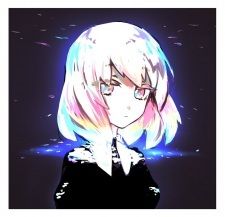|
If you liked
Shining Hearts: Shiawase no Pan
|
...then you might like
Escha & Logy no Atelier: Tasogare no Sora no Renkinjutsushi
|
Despite seeming to have the virtue of an attractive setting (although it’s the typical anime and videogame version of the magic + swords fantasy scenario), both anime turn out to be bad because of their erratic plots. Their scripts get lost quickly and love resorting to filler episodes, to get nowhere by the end. And the flamboyant titles eventually have little do with the actual content. That’s as far as the “recommendation” goes.
|
If you liked
Kaleido Star
|
...then you might like
Skip Beat!
|
Different styles but the protagonists hold the same strength and will within them. They do not writhe in the face of difficulty, and even have the time to cheer up for those around them. Comedy is far more highlighted in Skip Beat! but through different abilities both stories work within the entertainment world and the hardships to reach the top between other competitors.
|
If you liked
Ano Hi Mita Hana no Namae wo Bokutachi wa Mada Shiranai.
|
...then you might like
Ano Natsu de Matteru
|
Stories about friendship and love with an extra touch of supernatural or sci-fi. AnoHana focuses on drama and AnoNatsu is more of a comedy, so the main similarities between these series are in their animation and seasonal-focused themes (spring and summer). Plus the nostalgic sort of title. All the same, characterisation and the evolution of the protagonists' relationships have a lot in common, and both stories give off a similar feeling at the end. If you're in for touching and lively stories, go ahead and try both.
|
If you liked
Ichigo 100%
|
...then you might like
Hatsukoi Limited.
|
After watching Ichigo 100%, you'll find a much better example of a comedy/harem in Hatsukoi Limited (AKA First Limited Loved). It’s got far better developed characters and story, and ecchi is present but not so extremely overused. It's perfectly noticeable both series were created by the both author, though Hatsukoi Limited surpasses Ichigo 100%'s animation and music in quality.
|
If you liked
Kiniro no Corda: Primo Passo
|
...then you might like
Neo Angelique Abyss
|
Even with all its flaws, La Corda d'Oro is definitely a better anime than Neo Angelique Abyss, but if you like reverse harem series and the art style you might as well enjoy both. They're the same in those aspects, and in both series a varied group of guys fall in love with the protagonist (sometimes for no apparent reason) and the two series includes supernatural or fantasy elements.
|
If you liked
Dog Days
|
...then you might like
No Game No Life
|
If you watched No Game No Life solely for its game strategy (which is the best of the series), ignore this recommendation. There is no comparison between the quality of the development and story of Dog Days and No Game No Life, however if you enjoyed the fanservice, the lolis, the nonsensical humour, the ecchi comedy and the scenes with animal girls of the latter, then you're likely to enjoy Dog Days too since it has more of the same. Despite their differences in both series the main characters are drawn into a fantasy world where war and conquests between the various countries are solved through games.
|
If you liked
Superflat Monogram
|
...then you might like
Summer Wars
|
The almost 2-hours long Summer Wars and the 5-minutes long Superflat Monogram special aren't comparable in story and characters, but if you enjoyed the virtual world of Oz from Summer Wars you'll find a few more minutes of that curious lively animation in Superflat Monogram.
|
If you liked
Monochrome Myst
|
...then you might like
Majo no Shinzou
|
Lonely individuals that see what others can not, usually passing by unnoticed and having as company and protection an object that can turn into human form, reencounters with acquaintances from long time ago, myths, rumours and mysterious books. Whereas Majo no Shinzou has a more fantastical setting both manga have a Historical touch with occasional comical moments and decent art particularly in Majo no Shinzou, where it's outstanding especially because of the detailed backgrounds and the coloured pages that are missing in Monochrome Myst. The stories are formed by a series of cases that the characters get involved in through variety of scenarios, though the episodic format is more noticeable and better treated in Majo no Shinzou. Death is in both cases represented as a black substance that's composed solely of darkness that consumes life, which has a deeper meaning in Majo no Shinzou.
















